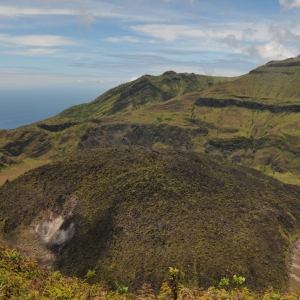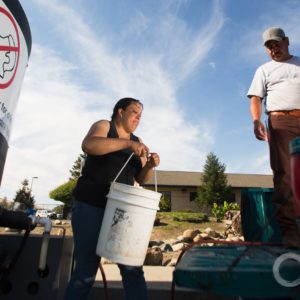Federal Water Tap, April 26: Senate Republicans Make Infrastructure Counteroffer
The Rundown
The White House announces an interagency drought working group. Two EPA regional offices botched their oversight duties for Clean Water Act permits, the agency’s internal watchdog found. USGS scientists find a long-term reduction in salt levels in the Upper Colorado River basin but less progress and even increasing levels in the last two decades. The EPA will kick off public listening sessions this week for the Lead and Copper Rule. And lastly, NOAA is updating its climate ‘normals,’ shifting the baseline for average precipitation and temperature.
“We don’t have any intention of going back to the original Obama Waters of the U.S. verbatim and we don’t necessarily agree with everything that was in the Trump administration’s version as well. We’ve learned lessons from both, we’ve seen complexities in both and we’ve determined that both rules did not necessarily listen to the will of the people.” — Michael Regan, the EPA administrator, testifying before the House Appropriations Committee.
By the Numbers
$78 million: Grants provided by the Migratory Bird Conservation Commission for wetlands protection in the United States, Canada, and Mexico. The commission is chaired by the secretary of the Interior.
News Briefs
Senate Republicans Make Infrastructure Counteroffer
Senate Republicans offered a slimmed down version of an infrastructure package, proposing $568 billion over five years for the country’s connective systems.
Transportation (roads, bridges, rail, public transit, airports) would get three-quarters of the funds. Drinking water and wastewater treatment clock in at $35 billion, a fraction of the White House’s wish of $111 billion. The Republican plan includes $14 billion for water storage, a perennial demand from their western caucus.
Unlike the Biden plan, this proposal aims to raise funds without increasing corporate taxes.
Drought Working Group
Because of seriously dry conditions across the western United States, the White House announced that Cabinet leaders will coordinate responses to assist communities in need.
The interagency working group will be chaired by the heads of the Agriculture and Interior departments.
Studies and Reports
Defense Department Climate Risk
The Defense Department released a report on exposure to climate hazards for domestic and overseas military installations. River flooding, coastal flooding, heat, and wildfires all the major risks highlighted, with drought being identified as the dominant factor.
The report does not go into base-level detail, which will be a future focus. The department said that all major domestic installations will be assessed within 12 months and overseas bases within 24 months.
Salinity in Upper Colorado River Basin
U.S. Geological Survey scientists found a “complex” situation for salt concentrations in the waters of the Upper Colorado River basin.
Salt levels declined in the last 90 years, according to a study published in Water Resources Research. Large reductions occurred especially after salt-control projects were put in place in the 1980s. In the last two decades, however, salt reductions have slowed or even increased.
“These findings indicate the issue of salinity in the Colorado River Basin is very complex,” said Christine Rumsey, the lead author of the study. “Further work is needed to better understand the roles that climate change, land-use, reservoirs, population dynamics and irrigation practices play in salinity issues, which impact the economic well-being of the West and are important to U.S. relations with Mexico.”
EPA Regional Offices Botched Water Permitting
Regional offices did not adequately perform their oversight duties in reviewing Clean Water Act permits in Minnesota and West Virginia, according to an investigation by the EPA’s internal watchdog.
The Office of the Inspector General found that Region 5 did not file comments with Minnesota officials stating its position on the PolyMet copper-nickel mine. The regional office also did not determine whether the project would affect the Fond du Lac Band of Lake Superior Chippewa, whose lands are downstream.
In West Virginia, Region 3 failed to properly review 286 mining discharge permits.
On the Radar
Lead and Copper Rule Listening Sessions
On April 28, the EPA will hold the first of two public listening sessions as part of its review of federal rules for lead in drinking water.
The second session will be May 5. Both sessions will run from 10:00 a.m. to 10:00 p.m. Eastern.
EPA Budget Hearing
On April 28, the Senate Committee on Environment and Public Works will host Michael Regan, the EPA administrator, for a discussion of the agency’s 2022 budget request.
New Climate ‘Normals’
On May 4, ‘normal’ temperature and precipitation in the United States will be redefined and the new measurements will bear the mark of a warming planet.
These climate normals, updated every decade, are based on a 30-year time period. Next month the 1981-2010 period will be discarded and replaced with the 1991-2020 interval.
Doing so will incorporate a decade that was the hottest on record, meaning that warming is “pretty widespread but not ubiquitous,” said Michael Palecki, a project manager. The northern plains trended cooler, especially in spring, he said. Precipitation was more variable: wetter in the Southeast and Central regions and drier in the Southwest. (Slides from NOAA’s preview.)
Federal Water Tap is a weekly digest spotting trends in U.S. government water policy. To get more water news, follow Circle of Blue on Twitter and sign up for our newsletter.
Brett writes about agriculture, energy, infrastructure, and the politics and economics of water in the United States. He also writes the Federal Water Tap, Circle of Blue’s weekly digest of U.S. government water news. He is the winner of two Society of Environmental Journalists reporting awards, one of the top honors in American environmental journalism: first place for explanatory reporting for a series on septic system pollution in the United States(2016) and third place for beat reporting in a small market (2014). He received the Sierra Club’s Distinguished Service Award in 2018. Brett lives in Seattle, where he hikes the mountains and bakes pies. Contact Brett Walton






Leave a Reply
Want to join the discussion?Feel free to contribute!